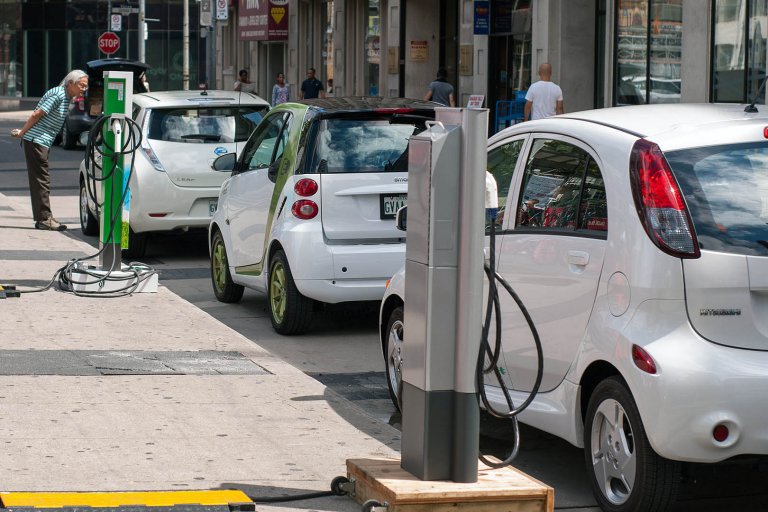
European Union imposes big taxes in battle over electric car sales with China
Large taxes will be applied to electric vehicle imports from China to the EU, after a majority of member states backed the measure.
The decision to introduce tariffs aims to protect the European car industry against what EU politicians believe are unfair subsidies by the Chinese government for its own cars.
Tariffs on Chinese-made electric cars are set to rise from 10% to as much as 45% over the next five years, but there are concerns this move could increase electric vehicle prices for consumers.
The decision, which divided EU member states such as France and Germany, risks triggering a trade war between Brussels and Beijing, which has condemned the tariffs as protectionist.
China has been banking on high-tech products to help revitalize its weakened economy, and the EU is the biggest foreign market for the country’s electric car industry.
China’s auto industry has grown rapidly over the past two decades, and its brands such as BYD have begun to enter international markets, raising fears that European companies will not be able to compete with the lower prices.
The EU imposed import tariffs of different levels on Chinese manufacturers over the summer, but Friday’s vote decided whether those tariffs would be implemented for the next five years.
The rates were calculated based on estimates of how much Chinese state subsidy each manufacturer received, following an EU investigation. The European Commission has set individual taxes for three major Chinese electric vehicle brands – SAIC, BYD and Geely.
EU members were divided over tariffs. Germany, whose car industry relies heavily on exports to China, was against it. Many EU members abstained from voting.
German car manufacturers have spoken out against the tariffs. Volkswagen said the tariffs were “the wrong approach.”
However, France, Italy, the Netherlands and Poland supported the import duties. The tariff proposal could only have been blocked if a qualified majority of 15 members voted against it.
Germany’s main industry association, BDI, called on the European Union and China to continue trade talks on the tariffs to avoid an “escalating trade conflict.”
The European Commission, which held the vote, said the EU and China “will work hard to explore an alternative solution” to import duties to address what it called “harmful subsidies” of Chinese electric vehicles.
China’s Ministry of Commerce called the decision to impose tariffs “unfair” and “irrational” but added that the issue could be resolved through negotiations.
The dispute has raised fears among industry groups outside the auto sector that they could face retaliatory tariffs from China.
A French cognac industry trade group said French authorities had “abandoned us.”
“We don’t understand why our industry is being sacrificed in this way.”
It said a negotiated solution needed to be found to “prevent our products from facing a surcharge that could exclude them from the Chinese market.”
‘Serious concerns’ about UK sales
Figures show that in August this year, battery electric car registrations in the EU fell by 43.9% compared to the previous year.
In the UK, demand for new electric vehicles hit a new record in September, but orders were mainly driven by commercial deals and big discounts from manufacturers, according to the industry trade body.
The Society of Motor Manufacturers and Traders (SMMT) said companies have “serious concerns as the market is not growing fast enough to meet mandatory targets”.
The industry has warned that consumers need better incentives to buy electric cars to help manufacturers ahead of a planned ban on sales of new petrol and diesel vehicles. Under the Conservative government, the deadline for this ban was pushed back to 2035, but the Labor Party has committed to bringing the deadline back to 2030.
Car manufacturers are required to meet sales targets for electric vehicles. Under the Zero Emission Vehicles (ZEV) mandate, at least 22% of vehicles sold this year must be zero-emission, with the target reaching 80% in 2030 and 100% in 2035.
Manufacturers who fail to meet quotas can be fined £15,000 per car.
The bosses of several carmakers, including BMW, Ford and Nissan, wrote to Chancellor Rachel Reeves on Friday, saying the industry is unlikely to meet those targets.
They said economic factors such as higher costs of energy, materials and interest rates have caused electric cars to remain “stubbornly more expensive, and consumers are reluctant to invest.” The average cost of buying an electric car in the UK is around £48,000.
They said a “lack of confidence” in the UK’s charging infrastructure was another barrier to encouraging people to switch to electric vehicles.
By Michael Race, Business Reporter, BBC News
Source: https://www.ocafezinho.com/2024/10/04/europa-impoe-pesadissimas-tarifas-para-importacoes-de-carros-eletricos-da-china/

